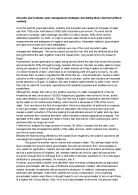To what extend is the water of the Nile Valley being used in a sustainable way?
To what extend is the water of the Nile Valley being used in a sustainable way?
The Niles is the longest river that flows from south to north in North Africa. It provides water to 300 million people living in the ten riparian countries, which includes Egypt, Sudan, Ethiopia, Uganda, Kenya, Tanzania, DRC, Rwanda, Eritrea, and Burundi. Due to the booming population and desertification, those are 10 of the 58 countries experiencing a water scarcity or water stress. There are two key things done to control the Niles. They are the two treaties signed in 1929 and 1959 that favored Egypt and Sudan, and the Aswan High Dam, mainly benefiting Egypt.
Firstly, mostly due to the build of dam, the Nile water is multifunctional, but mainly benefited Egypt. For example, it generates half of Egypt’s power supply through hydro-electric power, controls the annual floods that causes damage along the floodplain, improves navigation by keeping water flow consistent. Also, with the electricity, it helps pump water to higher levels, leaving a 12km wide land arable. Moreover, Egypt also modified its irrigation method; such as by using drip irrigation, water drips on plants through plastic pipes with small holes let less water being wasted by evaporation or drainage. These changes all try to use water in a more sustainable way.







